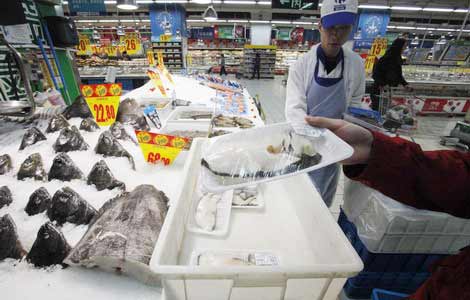|
 |
|
A salesman promotes cod in a supermarket in Shanghai on Wednesday. [Photo / China Daily] |
Cheaper oilfish falsely advertised as more costly seafood in stores
Healthy cod or questionable oilfish?
Residents in a number of Chinese cities have been wondering the same thing when they scan local supermarkets.
"Cod, for example, high in protein and low in fat content, is good for the brain development of children," said Tan Guijun, deputy head of the nutrition department at Tianjin First Center Hospital.
"That's why it's popular among parents."
But oilfish, a kind of mackerel, contains a high level of fat - almost 20 percent of its weight - and is not comparable with cod in nutrition.
However, some markets have been falsely advertising the cheaper oilfish as cod to improve their profits, according to experts.
"It's mainly because it's hard even for fishery experts to tell the difference of the two species from appearances after they are cut into pieces when they are sold," said Tang Wenqiao, a professor at the fish research office under Shanghai Ocean University.
Some nutritionists said deep-sea fish products are recommended, especially for young kids. But oilfish is different.
"The high fat will not be absorbed by the human body and will cause diarrhea, especially among kids, whose digestive functions are not fully developed," said Gu Zhongyi, a dietitian at the Beijing Friendship Hospital affiliated to the Capital Medical University.
One Beijing resident commented online that her daughter's inexplicable oily excretions a month ago were caused by eating oilfish sold as cod.
"Lab workers detected high levels of fat in her excretions, but we couldn't understand that," she commented.
Many people in Beijing, Henan and Zhejiang provinces were reported to have suffered from stomachache and diarrhea in recent years after eating what they believed was cheap cod, but was actually oilfish.
Liu Yun, a 47-year-old Beijing housewife, said she purchases the lowest priced fish from the supermarket twice a month.
"I never wonder whether it's real cod or not, and none of my family members has been sick after eating it. It's cheap and delicious," she said.
But some countries have banned selling oilfish as food, and use it as a lubricant for industrial manufacturing.
Japan lists the fish as a toxic species and prohibits its import and sales. Italy, Australia and New Zealand have warned people not to eat the fish for safety concerns.
But oilfish is not prohibited in China.
Consumers can distinguish between the two by how they feel in the mouth, according to Fan Shoulin, secretary-general of Shanghai Fisheries Trade Association. Cod melts quickly in the mouth and the meat is fine and smooth, but oilfish tastes greasy and coarse.
Zheng Jinran in Beijing contributed to this story.
